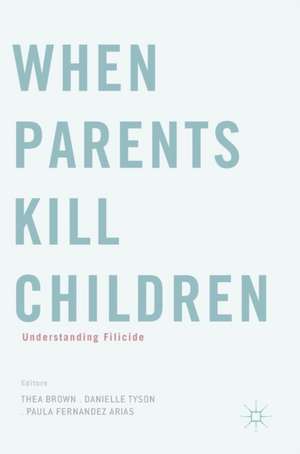When Parents Kill Children: Understanding Filicide
Editat de Thea Brown, Danielle Tyson, Paula Fernandez Ariasen Limba Engleză Hardback – 17 ian 2018
Exploring a truly diverse range of countries, from various English speaking countries, to Chile, and Japan, this book presents an authoritative look at research on filicide, and crucially, examines the programs currently being developed for both intervention and prevention. An important and well-researched collection, this book will be of particular interest for scholars of do
mestic violence and filicide, as well as professionals such as social workers.
| Toate formatele și edițiile | Preț | Express |
|---|---|---|
| Paperback (1) | 778.76 lei 6-8 săpt. | |
| Springer International Publishing – 3 iun 2019 | 778.76 lei 6-8 săpt. | |
| Hardback (1) | 783.98 lei 6-8 săpt. | |
| Springer International Publishing – 17 ian 2018 | 783.98 lei 6-8 săpt. |
Preț: 783.98 lei
Preț vechi: 956.08 lei
-18% Nou
Puncte Express: 1176
Preț estimativ în valută:
150.03€ • 155.75$ • 125.10£
150.03€ • 155.75$ • 125.10£
Carte tipărită la comandă
Livrare economică 25 martie-08 aprilie
Preluare comenzi: 021 569.72.76
Specificații
ISBN-13: 9783319630960
ISBN-10: 3319630962
Pagini: 269
Ilustrații: XXIV, 267 p. 11 illus., 4 illus. in color.
Dimensiuni: 148 x 210 x 24 mm
Greutate: 0.5 kg
Ediția:1st ed. 2018
Editura: Springer International Publishing
Colecția Palgrave Macmillan
Locul publicării:Cham, Switzerland
ISBN-10: 3319630962
Pagini: 269
Ilustrații: XXIV, 267 p. 11 illus., 4 illus. in color.
Dimensiuni: 148 x 210 x 24 mm
Greutate: 0.5 kg
Ediția:1st ed. 2018
Editura: Springer International Publishing
Colecția Palgrave Macmillan
Locul publicării:Cham, Switzerland
Cuprins
Part I: Incidence
1. Canadian Trends in Filicide by Gender of the Accused, 1961–2011; Myrna Dawson
2. The Incidence of Filicide in Chile, a Study of the Years 2010 to 2012; Roberto M. Rodríguez and Paula Fernandez Arias
3. Developing an Understanding of Filicide in South Africa; Shanaaz Mathews and Naeemah Abrahams
4. Filicide in Japn ; Katsuhiro Yasumi
Part II: Explaining Filicide
5. When Men Murder Children; Russell Dobash and Rebecca Dobash
6. A New Paradigm on Family Assailants; Colin Pritchard, Richard Williams and Paula Fernandez Arias.
7. Familicide-Suicide; Carolyn Johnson and Mark Sachmann.
8. Explaining Filicide in Australia; Thea Brown, Danielle Tyson and Paula Fernandez Arias.
9. Filicide and Children with Special Healthcare Needs in Arizona; Shannon Rupp
Part III: Intervention and Prevention
10. Protecting Children Living with Domestic Violence; Randal David and Peter Jaffe.
11. What Can Professionals and Families Do? Missed Opportunities to Protect ; Jo Cavanagh.
12. Preventing Filicide through Reform to the Mental Health Act (2001); Una Butler.
13. Raising the Status of Families, Friends and Community Members in Reviewing Domestic Homicides; Frank Mullane
Notă biografică
Thea Brown is Professor (Emerita) in the Department of Social Work, Monash University, Victoria, Australia, and is co-director of the Monash-Deakin Filicide Research Hub.
Danielle Tyson is Senior Lecturer in Criminology in the School of Humanities and Social Sciences at Deakin University, Victoria, Australia, and is co-director of the Monash-Deakin Filicide Research Hub.
Paula Fernandez Arias is an associate researcher with the Monash-Deakin Filicide Research Hub.
Danielle Tyson is Senior Lecturer in Criminology in the School of Humanities and Social Sciences at Deakin University, Victoria, Australia, and is co-director of the Monash-Deakin Filicide Research Hub.
Paula Fernandez Arias is an associate researcher with the Monash-Deakin Filicide Research Hub.
Textul de pe ultima copertă
This edited collection addresses a substantial gap in the existing literature on filicide by presenting the latest research from empirical investigations around the world. Despite its low occurrence, little is known about the incidences, causes and circumstances of filicide nationally and globally, and this international volume address the challenges associated with explaining and understanding filicide. Additionally, the authors also outline the role of professionals in assessing risk, and the importance of support for, and advocacy of, families of victims in the aftermath of these tragic events.
Exploring a truly diverse range of countries, from various English speaking countries, to Chile, and Japan, this book presents an authoritative look at research on filicide, and crucially, examines the programs currently being developed for both intervention and prevention. An important and well-researched collection, this book will be of particular interest for scholars of domestic violence and filicide, as well as professionals such as social workers.
Caracteristici
Examines the widely-misunderstood topic of filicide, including the types, circumstances and causes leading to these tragic events
Explores case studies in countries such as the US, Chile, South Africa, Ireland, Chile, and Japan
Addresses the involvement of family and friends in the aftermath of filicide
Explores case studies in countries such as the US, Chile, South Africa, Ireland, Chile, and Japan
Addresses the involvement of family and friends in the aftermath of filicide
